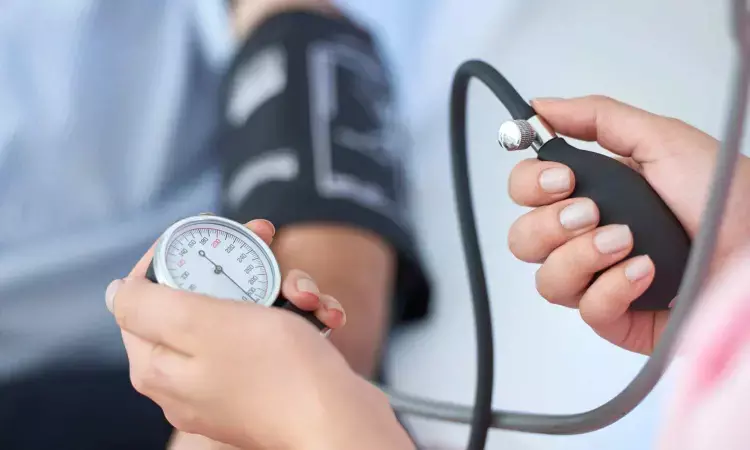- Home
- Medical news & Guidelines
- Anesthesiology
- Cardiology and CTVS
- Critical Care
- Dentistry
- Dermatology
- Diabetes and Endocrinology
- ENT
- Gastroenterology
- Medicine
- Nephrology
- Neurology
- Obstretics-Gynaecology
- Oncology
- Ophthalmology
- Orthopaedics
- Pediatrics-Neonatology
- Psychiatry
- Pulmonology
- Radiology
- Surgery
- Urology
- Laboratory Medicine
- Diet
- Nursing
- Paramedical
- Physiotherapy
- Health news
- Fact Check
- Bone Health Fact Check
- Brain Health Fact Check
- Cancer Related Fact Check
- Child Care Fact Check
- Dental and oral health fact check
- Diabetes and metabolic health fact check
- Diet and Nutrition Fact Check
- Eye and ENT Care Fact Check
- Fitness fact check
- Gut health fact check
- Heart health fact check
- Kidney health fact check
- Medical education fact check
- Men's health fact check
- Respiratory fact check
- Skin and hair care fact check
- Vaccine and Immunization fact check
- Women's health fact check
- AYUSH
- State News
- Andaman and Nicobar Islands
- Andhra Pradesh
- Arunachal Pradesh
- Assam
- Bihar
- Chandigarh
- Chattisgarh
- Dadra and Nagar Haveli
- Daman and Diu
- Delhi
- Goa
- Gujarat
- Haryana
- Himachal Pradesh
- Jammu & Kashmir
- Jharkhand
- Karnataka
- Kerala
- Ladakh
- Lakshadweep
- Madhya Pradesh
- Maharashtra
- Manipur
- Meghalaya
- Mizoram
- Nagaland
- Odisha
- Puducherry
- Punjab
- Rajasthan
- Sikkim
- Tamil Nadu
- Telangana
- Tripura
- Uttar Pradesh
- Uttrakhand
- West Bengal
- Medical Education
- Industry
Systolic BP Polygenic risk score predicts patients at risk of treatment-resistant HTN who may benefit from chlorthalidone: JAMA

UK: Recent research highlights the potential of using a Systolic Blood Pressure (SBP) Polygenic Risk Score (PRS) to predict responses to chlorthalidone in individuals with hypertension, particularly among Black patients. This study, published in JAMA Cardiology, has significant implications for personalizing hypertension treatment, which is crucial given the varying responses to medication observed in different populations.
The researchers found that a high SBP polygenic risk score was linked to a diminished blood pressure response to chlorthalidone, suggesting it could serve as a valuable tool for personalizing treatment decisions to achieve optimal BP control in individuals with hypertension.
The clinical value of PRS in predicting blood pressure responses to antihypertensive treatment (AHT) remains unclear. To address this gap, Nicole D. Armstrong, Department of Epidemiology, University of Alabama at Birmingham, and colleagues sought to examine the effectiveness of a systolic BP PRS in forecasting AHT responses and identifying apparent treatment-resistant hypertension (aTRH).
For this purpose, the researchers analyzed data from the Genetics of Hypertension Associated Treatments (GenHAT) study, an ancillary pharmacogenomic study linked to the Antihypertensive and Lipid-Lowering Treatment to Prevent Heart Attack Trial (ALLHAT). The original ALLHAT study enrolled participants aged 55 and older with hypertension between February 1994 and March 2002. The current study focused on a subset of Black GenHAT participants who were randomized to receive either chlorthalidone (3,745 participants) or lisinopril (2,294 participants) and had genetic data from a prior study.
The SBP PRS included 1,084,157 genetic variants and was stratified into quintiles and standard deviations. The primary outcomes measured were systolic and diastolic blood pressure changes over six months. aTRH was defined as the need for three antihypertensive medications with uncontrolled hypertension at three years or taking four or more medications regardless of blood pressure.
Baseline demographics were compared across PRS quintiles using appropriate statistical tests. The researchers calculated the mean blood pressure responses using multivariable-adjusted linear regression and assessed odds ratios for aTRH with multivariable-adjusted logistic regression.
The study led to the following findings:
- Among 3,745 Black GenHAT participants receiving chlorthalidone, the median age was 65 years (IQR: 60-71), with 55.1% being female.
- Each increasing quintile of the SBP PRS (1 to 5) was linked to a decreased blood pressure response over six months.
- Participants in the lowest SBP PRS quintile showed a mean change in systolic blood pressure (ΔSBP) of −10.01 mm Hg, while those in the median quintile had a ΔSBP of −6.57 mm Hg.
- No significant associations were found between the SBP PRS and blood pressure response to lisinopril.
- Participants in the highest PRS quintile had 67% higher odds of experiencing apparent treatment-resistant hypertension compared to those in the median quintile (odds ratio: 1.67).
- These associations were validated independently.
The results of this genetic association study indicate that two separate SBP polygenic risk scores (PRS) are linked to how well Black adults respond to chlorthalidone and their risk of apparent treatment-resistant hypertension (aTRH), supporting earlier findings related to cardiovascular outcomes.
"While more research is needed to confirm these results in clinical settings, using an SBP PRS could be a valuable approach for predicting how well patients will respond to antihypertensive treatment. This method may also help identify individuals who would benefit from more aggressive therapy," the researchers concluded.
Reference:
Armstrong ND, Srinivasasainagendra V, Patki A, et al. Utility of a Systolic Blood Pressure Polygenic Risk Score With Chlorthalidone Response. JAMA Cardiol. Published online October 23, 2024. doi:10.1001/jamacardio.2024.3649
Dr Kamal Kant Kohli-MBBS, DTCD- a chest specialist with more than 30 years of practice and a flair for writing clinical articles, Dr Kamal Kant Kohli joined Medical Dialogues as a Chief Editor of Medical News. Besides writing articles, as an editor, he proofreads and verifies all the medical content published on Medical Dialogues including those coming from journals, studies,medical conferences,guidelines etc. Email: drkohli@medicaldialogues.in. Contact no. 011-43720751


